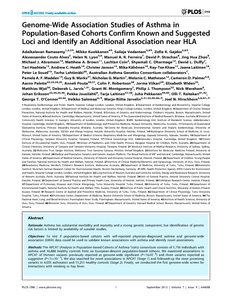Ramasamy, A;
Kuokkanen, M;
Vedantam, S;
Gajdos, ZK;
Couto Alves, A;
Lyon, HN;
Ferreira, MA;
Strachan, DP;
Zhao, JH;
Abramson, MJ;
et al.
Ramasamy, A; Kuokkanen, M; Vedantam, S; Gajdos, ZK; Couto Alves, A; Lyon, HN; Ferreira, MA; Strachan, DP; Zhao, JH; Abramson, MJ; Brown, MA; Coin, L; Dharmage, SC; Duffy, DL; Haahtela, T; Heath, AC; Janson, C; Kähönen, M; Khaw, KT; Laitinen, J; Le Souef, P; Lehtimäki, T; Australian Asthma Genetics Consortium Collaborators; Madden, PA; Marks, GB; Martin, NG; Matheson, MC; Palmer, CD; Palotie, A; Pouta, A; Robertson, CF; Viikari, J; Widen, E; Wjst, M; Jarvis, DL; Montgomery, GW; Thompson, PJ; Wareham, N; Eriksson, J; Jousilahti, P; Laitinen, T; Pekkanen, J; Raitakari, OT; O'Connor, GT; Salomaa, V; Jarvelin, MR; Hirschhorn, JN
(2012)
Genome-wide association studies of asthma in population-based cohorts confirm known and suggested loci and identify an additional association near HLA.
PLOS ONE, 7 (9).
e44008.
ISSN 1932-6203
https://doi.org/10.1371/journal.pone.0044008
SGUL Authors: Strachan, David Peter
![[img]](https://openaccess.sgul.ac.uk/101534/1.hassmallThumbnailVersion/pone.0044008.pdf)  Preview |
|
["document_typename_application/pdf; charset=binary" not defined]
Published Version
Download (415kB)
| Preview
|
Abstract
RATIONALE: Asthma has substantial morbidity and mortality and a strong genetic component, but identification of genetic risk factors is limited by availability of suitable studies.
OBJECTIVES: To test if population-based cohorts with self-reported physician-diagnosed asthma and genome-wide association (GWA) data could be used to validate known associations with asthma and identify novel associations.
METHODS: The APCAT (Analysis in Population-based Cohorts of Asthma Traits) consortium consists of 1,716 individuals with asthma and 16,888 healthy controls from six European-descent population-based cohorts. We examined associations in APCAT of thirteen variants previously reported as genome-wide significant (P<5 x 10(-8)) and three variants reported as suggestive (P<5× 10(-7)). We also searched for novel associations in APCAT (Stage 1) and followed-up the most promising variants in 4,035 asthmatics and 11,251 healthy controls (Stage 2). Finally, we conducted the first genome-wide screen for interactions with smoking or hay fever.
MAIN RESULTS: We observed association in the same direction for all thirteen previously reported variants and nominally replicated ten of them. One variant that was previously suggestive, rs11071559 in RORA, now reaches genome-wide significance when combined with our data (P = 2.4 × 10(-9)). We also identified two genome-wide significant associations: rs13408661 near IL1RL1/IL18R1 (P(Stage1+Stage2) = 1.1x10(-9)), which is correlated with a variant recently shown to be associated with asthma (rs3771180), and rs9268516 in the HLA region (P(Stage1+Stage2) = 1.1x10(-8)), which appears to be independent of previously reported associations in this locus. Finally, we found no strong evidence for gene-environment interactions with smoking or hay fever status.
CONCLUSIONS: Population-based cohorts with simple asthma phenotypes represent a valuable and largely untapped resource for genetic studies of asthma.
| Item Type: |
Article
|
| Additional Information: |
PMCID: PMC3461045
©2012 Ramasamy et al. This is an open-access article distributed under the terms of the Creative Commons Attribution License, which permits unrestricted use, distribution, and reproduction in any medium, provided the original author and source are credited. |
| Keywords: |
Adult, Asthma, Cohort Studies, Genetic Predisposition to Disease, Genome-Wide Association Study, HLA Antigens, Humans, Middle Aged, Polymorphism, Single Nucleotide, Quantitative Trait Loci, Risk Factors |
| SGUL Research Institute / Research Centre: |
Academic Structure > Population Health Research Institute (INPH) |
| Journal or Publication Title: |
PLOS ONE |
| ISSN: |
1932-6203 |
| Dates: |
| Date | Event |
|---|
| 28 September 2012 | Published |
|
| PubMed ID: |
23028483 |
| Web of Science ID: |
23028483 |
  |
Download EPMC Full text (PDF)
|
 |
Download EPMC Full text (HTML)
|
 |
Go to PubMed abstract |
| URI: |
https://openaccess.sgul.ac.uk/id/eprint/101534 |
| Publisher's version: |
https://doi.org/10.1371/journal.pone.0044008 |
Statistics
Item downloaded times since 27 Jun 2013.
Actions (login required)
 |
Edit Item |




